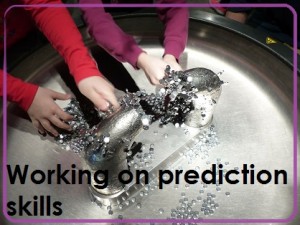Helen recently wrote about working on inferencing skills. You can read her post here. Today I am going to write about prediction skills. You are likely to see inferencing and prediction skills spoken about together and there are similarities between them. It is also highly likely that if you find one hard, you will also find the other hard!
So what is the difference between inferencing and prediction? If you infer information you have found clues and are making guesses about something that has happened in the past or is happening now. The information is often implicit and you have to pick it out. Whereas if you are making guesses about what will happen in the future, this is making a prediction. You use the information available to make a best guess at what should logically happen next.
If a child finds inferencing and prediction hard it is highly likely that their reading comprehension will also be affected. So we know this is an important area to support. Snowling and Hulme (2011) found that improving language skills is an effective way to improve reading comprehension. Prediction is also used all the time in science; you have to make your hypothesis (prediction) based on the information you know and then test your ideas.
We know that prediction is really important for school work, but what can we do to help?
We know that working with visual support is often the best way to start. You can use pictures or stories and talk about them with the child.
- You could talk about real life situations that the child will have experienced. This will mean that they are more likely to be able to predict outcomes. At a basic level, you could talk about daily activities. For example, when you have finished eating tea, what happens next? (Tidy up, wash the plates etc)
- When reading stories, you can ask what is going to happen next? In this way the child has to think about the story so far and make logical conclusions about what could happen next. If they find this hard, you could give them 2 or 3 options and they can choose one. Try and make one of the options ‘unlikely’ to help them choose a more suitable option! For example if your story is about a teddy bear having a picnic, one option could be that he ate some cake and the other option could be that he rides an elephant. Hopefully they will pick the option that he eats some cake!
- When you have finished reading a story, try and think up alternative endings. What else could the character have said or done? With older children you could generate a happy and sad ending. Maybe you could create a cliff hanger ending instead? You may find that one type of ending suits the story more and so feels more appropriate.
- You can also make predictions about feelings. Discuss the situation and what the person has done. Then encourage the child to think about or predict how that person would feel. They have to use the information about the situation and maybe what the person has said to draw a conclusion.
- Simple science experiments are also a great way to generate a theory, make predictions and then test your ideas. You could gather a range of everyday objects e.g. spoon, sponge, marble, paper etc and talk about if the item will float or sink if you put it in water. Hold the objects, think about how heavy they are etc and make a guess/ prediction about if they will sink or float. Then you get to test out your predictions! It can also lead to some useful discussions and predictions about why we aren’t going to put a phone in the water to check if it will sink or float!







Leave a Reply